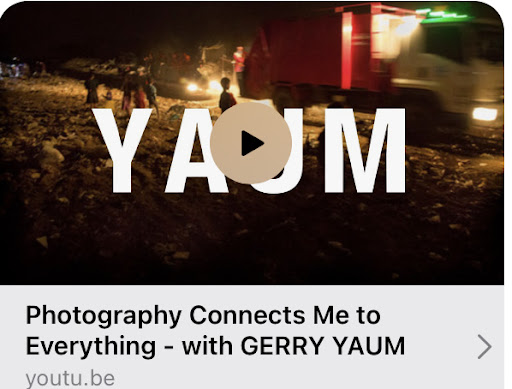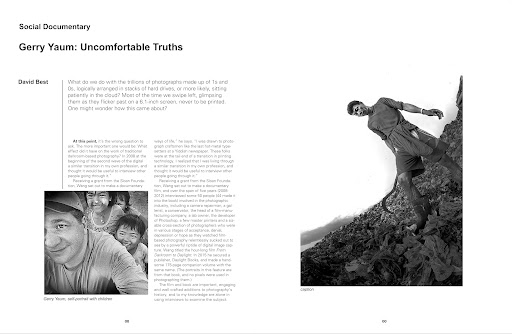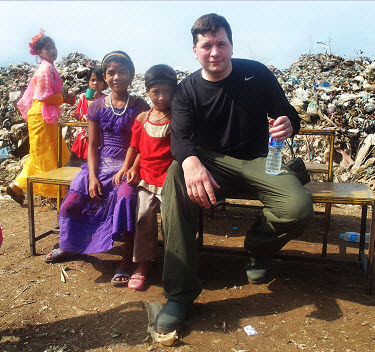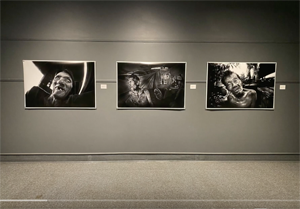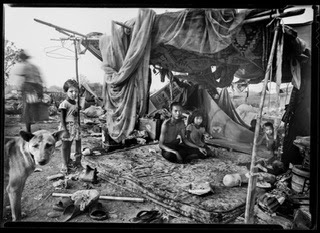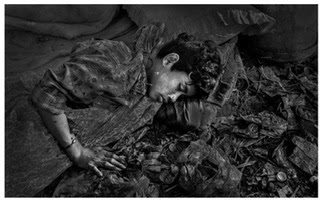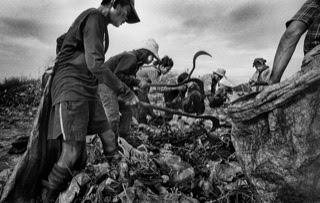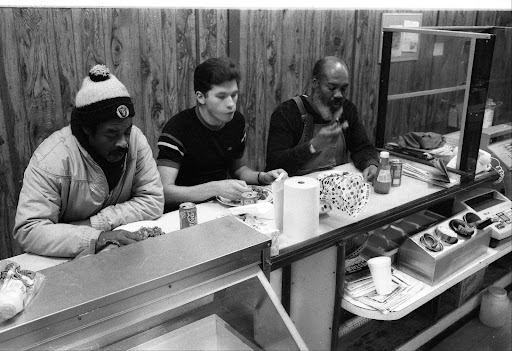How our lives change over time based on things we experience is an interesting concept. I have a friend who I grew up with, a friend that I have known since elementary school but our lives and life experiences have now become so different, after high school we went in different directions. He is now a private school teacher and tutor earning around $200 000 dollars a year (over 4 times what I make as a guard), he sends his children to a private school and lives in a expensive new house. My friend now lives a very different life than mine. He lives a good, happy, comfortable life but in a bit of a small segregated world, a Canada based upper middle class cocoon.
When I wrote an email to him recently half joking about diving for the $50 I found, he wrote back, "Dive for it? It was just $50 wasn't it?"
This comment got me thinking about how different our two lives had become and how much influence many of the things I had seen and experienced first hand over the last 30 years had changed me as a person. I made my $50 diving comment half in jest but was also half serious because I know so many people who would dive for money on the floor. $50 to these folks would be a fortune, heck they would probably dive for $5 and maybe fight for $10.
Being a small part of so many different lives since I started making documentary photographs when was 21 (turning 51 soon) has changed the way I view things. When you see people without money and how they act, you re-evaluate the TRUE value of $50 bill on the floor.
I remember:
Dupree Bolton a jazz trumpet player and heroin addict. He used to play the trumpet on the streets of San Francisco for the tourists for loose change. I was 21 when I first met him, we sort of became friends and he introduced me to the ghetto world of West Oakland California.
One of the things I remember most about Dupree was the time I was with him and he was counting the loose change he had earned that day. He was on his hands and knees counting nickels and dimes, desperately hoping he had enough to buy a $5 bag (balloon) of heroin. I remember photographing his hands as he dug through the change, slowly counting what he had. He did not have enough to buy the drugs, it was all so sad and pathetic
I remember:
The I remember the young children who would beg on the streets and walking bridges of Bangkok in 1999 my second visit to Thailand. I would photograph them as they begged from locals and tourists. I remember there eyes, how hot it was, how noisy it was, but what stands out most in my memories is the eyes of the begging adults and children.
I remember:
Sweet Nong who I knew as a freelance sex worker in 1999, and who I visited in 2003 again at her home. Nong was no longer working in the sex industry but she was living in abject poverty. She was always a small skinny girl but she was very much thinner when I met her again in 2003. She had 3 children that she struggled to support with her security guard boyfriend. They were living, but barely. It was so heartbreaking to see what had happened to a woman I knew, cared for and worried about.
I remember:
The hill tribe village I visited in Laos in 2010, and the Laos family I ate supper with. The family lived barely above the poverty line, 8 or so folks to a small house. I remember them giving me fried frogs and small little tomatoes to eat, they were so kind.
I remember:
The children with bare feet living in Klong Toey slum in Bangkok, who I photographed and taught English to. They laughed and followed me around saying the words I taught them. They asked me if I would come back and teach them some more, there was a real joy to them, so much potential.
I remember:
The slum living motorcycle taxi driver who was too proud to accept money when I offered it to him for his sick baby girl. He told me "We are Ok, my wife works also" (she sold cheap foods from a street stall).
I remember:
The dozens and dozens of sex workers I have photographed through the years who sold there bodies to earn money for their parents or their children back home.
I remember:
The young girl with big eyes in the Poipet slum in Cambodia. She just watched me quietly from the doorway of he slum home as I made photographs. What has become of her?
I remember:
Young Doo-aye digging through the garbage to earn money for her family. I remember the father from the dump filling the slop pail with rice he found and would recook for his two young boys. I remember the young man who worked harder and longer than anyone else to provide for his family. I remember the joy this same man felt when he built a little area under his shack for his children to lay on over and off the ground. I remember the 3 young children, brothers and sisters who watched me on the dump road.
I remember:
Anapon, living in his little Bangkok room under the free way and how when I gave him a bit of money he went off and bought a single egg and some rice for dinner. He immediately cooked everything up and ate while I photographed him.
I remember:
The street kids on Kathmandu Nepal. How they slept in the open, how they begged and begged for food and drug money, and how they loved the little dog who lived with them.
Having all these memories, being a small part of all those lives so profoundly affected by lack of money, changes how you evaluate money. My friend and I have lived different lives since high school we have different life experiences and those experiences have changed us as people. We look at $50 bill sitting on the ground in different ways. For him it's just a small telling comment "Dive for it? It was just $50 wasn't it?" For me it's "What would all those people from all those memories do with $50." "How would it affect there lives in a short term positive way at least?" "How happy would Nong, Anapon, Doo-aye or the begging street mother be if I gave them a $50 dollar bill?"
I just cannot look at $50 the same way as I did before, as my friend does now. Life experiences have changed my thinking, clouded my feelings and thoughts. Things are not as simple as they use to be.
When I wrote an email to him recently half joking about diving for the $50 I found, he wrote back, "Dive for it? It was just $50 wasn't it?"
This comment got me thinking about how different our two lives had become and how much influence many of the things I had seen and experienced first hand over the last 30 years had changed me as a person. I made my $50 diving comment half in jest but was also half serious because I know so many people who would dive for money on the floor. $50 to these folks would be a fortune, heck they would probably dive for $5 and maybe fight for $10.
Being a small part of so many different lives since I started making documentary photographs when was 21 (turning 51 soon) has changed the way I view things. When you see people without money and how they act, you re-evaluate the TRUE value of $50 bill on the floor.
I remember:
Dupree Bolton a jazz trumpet player and heroin addict. He used to play the trumpet on the streets of San Francisco for the tourists for loose change. I was 21 when I first met him, we sort of became friends and he introduced me to the ghetto world of West Oakland California.
One of the things I remember most about Dupree was the time I was with him and he was counting the loose change he had earned that day. He was on his hands and knees counting nickels and dimes, desperately hoping he had enough to buy a $5 bag (balloon) of heroin. I remember photographing his hands as he dug through the change, slowly counting what he had. He did not have enough to buy the drugs, it was all so sad and pathetic
I remember:
The I remember the young children who would beg on the streets and walking bridges of Bangkok in 1999 my second visit to Thailand. I would photograph them as they begged from locals and tourists. I remember there eyes, how hot it was, how noisy it was, but what stands out most in my memories is the eyes of the begging adults and children.
 |
| Mother begging with her child Sukhumvit road, Bangkok Thailand 1999 |
Sweet Nong who I knew as a freelance sex worker in 1999, and who I visited in 2003 again at her home. Nong was no longer working in the sex industry but she was living in abject poverty. She was always a small skinny girl but she was very much thinner when I met her again in 2003. She had 3 children that she struggled to support with her security guard boyfriend. They were living, but barely. It was so heartbreaking to see what had happened to a woman I knew, cared for and worried about.
 |
| Nong near her Bangkok slum home, Thailand 2003 |
The hill tribe village I visited in Laos in 2010, and the Laos family I ate supper with. The family lived barely above the poverty line, 8 or so folks to a small house. I remember them giving me fried frogs and small little tomatoes to eat, they were so kind.
 |
| Hill tribe girls, Laos 2011 |
The children with bare feet living in Klong Toey slum in Bangkok, who I photographed and taught English to. They laughed and followed me around saying the words I taught them. They asked me if I would come back and teach them some more, there was a real joy to them, so much potential.
 |
| My eager young English students Klong Toey Slum, Bangkok Thailand 2010 |
The slum living motorcycle taxi driver who was too proud to accept money when I offered it to him for his sick baby girl. He told me "We are Ok, my wife works also" (she sold cheap foods from a street stall).
I remember:
The dozens and dozens of sex workers I have photographed through the years who sold there bodies to earn money for their parents or their children back home.
 |
| Jo and Nit selling themselves outside a short time bar, Pattaya Thailand 2003 |
The young girl with big eyes in the Poipet slum in Cambodia. She just watched me quietly from the doorway of he slum home as I made photographs. What has become of her?
 |
| Young girl in doorway with big eyes, Poipet Cambodia 2010 |
Young Doo-aye digging through the garbage to earn money for her family. I remember the father from the dump filling the slop pail with rice he found and would recook for his two young boys. I remember the young man who worked harder and longer than anyone else to provide for his family. I remember the joy this same man felt when he built a little area under his shack for his children to lay on over and off the ground. I remember the 3 young children, brothers and sisters who watched me on the dump road.
 |
| Three Burmese children in the dump, Mae Sot Thailand 2013 |
Anapon, living in his little Bangkok room under the free way and how when I gave him a bit of money he went off and bought a single egg and some rice for dinner. He immediately cooked everything up and ate while I photographed him.
 |
| Anapon in his little room under the freeway, Bangkok 2013 |
The street kids on Kathmandu Nepal. How they slept in the open, how they begged and begged for food and drug money, and how they loved the little dog who lived with them.
 |
| Nepal street kid with the groups dog, Kathmandu Nepal 2013 |
I just cannot look at $50 the same way as I did before, as my friend does now. Life experiences have changed my thinking, clouded my feelings and thoughts. Things are not as simple as they use to be.



